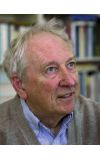
14 Oct 2011 09:02:50
Characterized by powerful imagery, Transtromer's poems are often built around his own experiences and infused with his love of music and nature. His later poems are darker, probing existential questions of life, death and disease.
Transtromer is considered a master of metaphor, weaving powerful images into his poems without much embellishment. The award citation noted that his collections "are characterized by economy."
"Waking up is a parachute jump from dreams. Free of the suffocating turbulence the traveler sinks toward the green zone of morning," reads the prelude to "The Great Enigma," his last collection, released in Swedish in 2004 and two years later in English.
"Things flare up. From the viewpoint of the quivering lark he is aware of the huge root systems of the trees, their swaying underground lamps," Transtromer wrote. "But aboveground there's greenery — a tropical flood of it — with lifted arms, listening to the beat of an invisible pump."
A psychologist and avid amateur pianist, Transtromer (TRAWN-stroh-mur), 80, suffered a stroke in 1990 that left him half-paralyzed and largely unable to speak, but he continued to write, publishing "The Sorrow Gondola" in 1996 and the "The Great Enigma." He has since retired from writing.
Transtromer has been a perennial favorite for the Nobel and in recent years Swedish journalists have waited outside Transtromer's apartment in Stockholm on the day the 10 million kronor ($1.5 million) award is announced.
"Very good," a smiling Transtromer told reporters when asked how he felt. He gave mostly one-syllable answers to reporters' questions, seated next to his wife, Monica, who filled in the details.
The couple had sat down in front of the TV to watch a live broadcast of the literature announcement when the phone rang, just five minutes before it was to start, she said.
"It was a very big surprise," she said. "Tomas, I know you were surprised. Despite the speculation for so many years you haven't really taken it seriously."
She said that, most of all, Transtromer was happy that the prize went to poetry for the first time since Wislawa Szymborska of Poland won in 1996.
Transtromer is the first Swede to receive the literature prize since Eyvind Johnson and Harry Martinson shared it in 1974. Peter Englund, permanent secretary of the Swedish Academy, has said that it is especially cautious about awarding Swedish writers out of fear of being seen as biased.
"I think we've been quite thoughtful and haven't been rash," Englund said after the award was announced.
"One should congratulate the academy, that finally, in the last minute, dares to give the prize to Transtromer, despite the fact he is Swedish," Swedish poet Bob Hansson wrote on his blog after the announcement. "The Swedish modesty, or the Swedish fear of being Swedish, has postponed Transtromer's award by at least 10 years."

